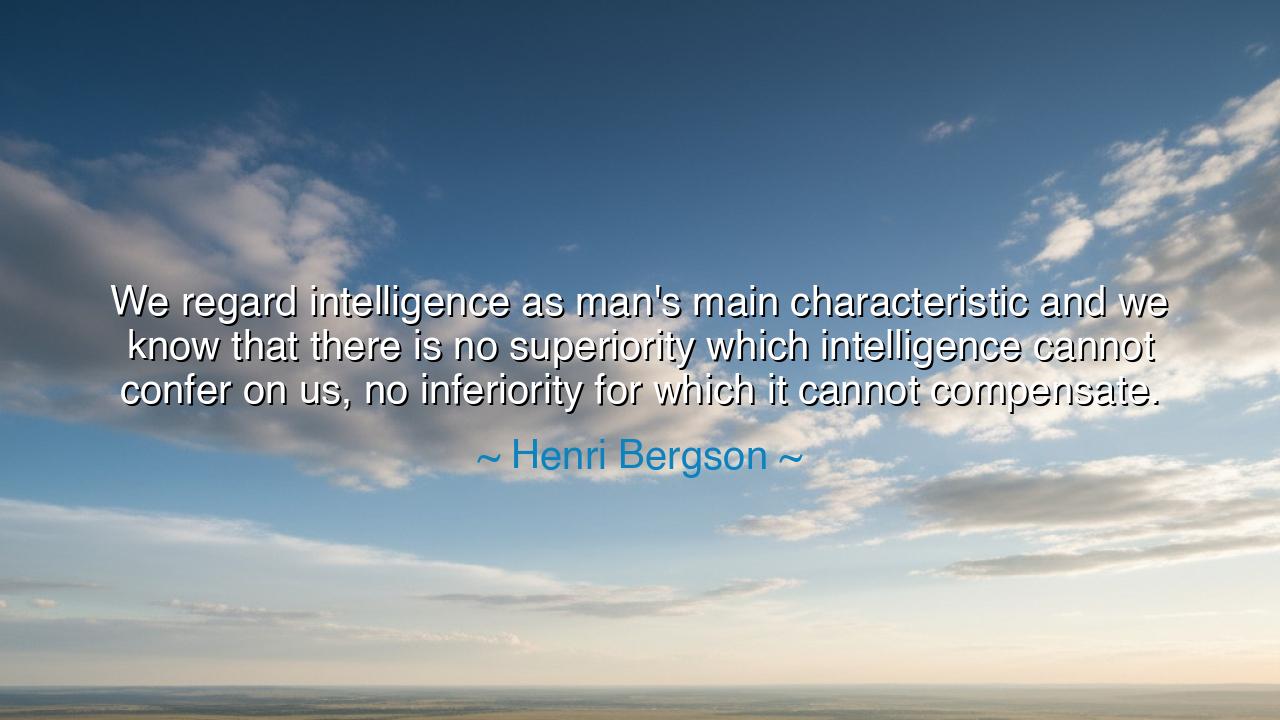
We regard intelligence as man's main characteristic and we know
We regard intelligence as man's main characteristic and we know that there is no superiority which intelligence cannot confer on us, no inferiority for which it cannot compensate.






The words of Henri Bergson, philosopher of time, consciousness, and the living spirit, carry the majesty of both reason and revelation: “We regard intelligence as man’s main characteristic and we know that there is no superiority which intelligence cannot confer on us, no inferiority for which it cannot compensate.” In this single reflection, Bergson offers a hymn to the divine power within humanity — the power of intelligence, the light that raises humankind above its frailties, that transforms weakness into mastery and ignorance into understanding. He declares that within the human mind lies the seed of boundless ascent — that intelligence is both our compass and our redemption, the faculty by which we shape the world and our destiny.
To understand the origin of this thought, we must step into the world of Henri Bergson, a French philosopher of the late nineteenth and early twentieth centuries, who sought to bridge the gap between the mechanical world of science and the living world of consciousness. He lived in an age where machines began to conquer the earth — steamships, factories, telegraphs, engines — and yet he saw that beneath the machinery of progress there was a deeper force: the mind’s creativity. Bergson believed that life itself was an act of intelligence — not the cold logic of calculation, but the warm, intuitive power that could penetrate the mysteries of existence. In his words, intelligence was not only man’s tool; it was his defining essence, the flame that separated him from the beasts and the brute elements of nature.
When Bergson declares that there is “no superiority which intelligence cannot confer, no inferiority for which it cannot compensate,” he is expressing the ancient truth that the mind is the great equalizer of the human condition. History overflows with examples of those born into obscurity, weakness, or adversity who rose through the power of thought. Consider Socrates, the son of a stonemason, who possessed neither wealth nor beauty, yet whose wisdom reshaped all philosophy. Consider Leonardo da Vinci, born illegitimate and uneducated in formal schools, yet who, through intelligence, became the model of human genius — artist, scientist, inventor, and seer. In every age, the power of intelligence has lifted the humble to greatness, proving that strength of mind surpasses strength of circumstance.
And yet, Bergson’s vision is not one of arrogance but of reverence. He does not say that intelligence grants superiority for its own sake, but that it allows humanity to transcend limits. He reminds us that the mind is a creative force — not to dominate others, but to elevate life itself. The ancients spoke of this same truth when they worshiped Prometheus, who stole fire from the gods and gave it to mankind. That fire was the fire of thought, of innovation, of discovery — the fire of intelligence that allowed humanity to stand upright and create civilization. But as every myth warns, such power demands balance. Intelligence, if used without wisdom, becomes destructive; but when tempered by humility and purpose, it becomes divine.
There is a story from the life of Helen Keller that beautifully embodies Bergson’s insight. Born blind and deaf, she seemed doomed to a life of silence and darkness — the very image of human limitation. And yet, through her own intelligence and the patient guidance of her teacher Anne Sullivan, Keller broke through the barriers of her senses to communicate, to learn, and to inspire. Her mind, though imprisoned by the body, found its way into the light. She once said, “My darkness had been filled with the light of intelligence.” Her story proves Bergson’s claim: that there is no inferiority intelligence cannot compensate — that within the mind’s fire lies the power to overcome all constraint.
Bergson’s statement is also a reminder that intelligence is not static, but living — it must be cultivated, exercised, and guided. To rely on intelligence is not to rest upon one’s natural cleverness, but to engage in the lifelong discipline of thought, of curiosity, and of self-awareness. Just as the body must be trained for strength, the mind must be sharpened for clarity. The ancients called this practice askesis — the training of the soul through contemplation, study, and dialogue. Bergson calls us to the same devotion: to honor our intelligence not as a weapon of pride, but as a sacred trust, a force meant to serve creation and truth.
Thus, the lesson of Henri Bergson’s words is both uplifting and humbling: that the highest strength of humanity lies not in power of body or privilege of birth, but in the intelligence that dwells within each person. It is a flame that can lift the lowest to greatness and redeem even the deepest imperfection. But this flame must be tended — with wisdom, with compassion, and with purpose. To neglect the mind is to bury the divine within; to cultivate it is to awaken the godlike within man.
So, dear listener, take this teaching into your own life. Cultivate your intelligence not only in knowledge but in understanding, not only in reason but in empathy. Let it be the light that illuminates your path and the instrument through which you serve the world. For as Bergson teaches, intelligence is the gift that allows humankind to rise, to heal, to create, and to overcome. It is the bridge between limitation and possibility — the proof that within each of us lies the infinite power to transform both ourselves and the world we inhabit. Use it well, and you will discover that there is truly no inferiority intelligence cannot overcome, and no greatness it cannot achieve.






AAdministratorAdministrator
Welcome, honored guests. Please leave a comment, we will respond soon